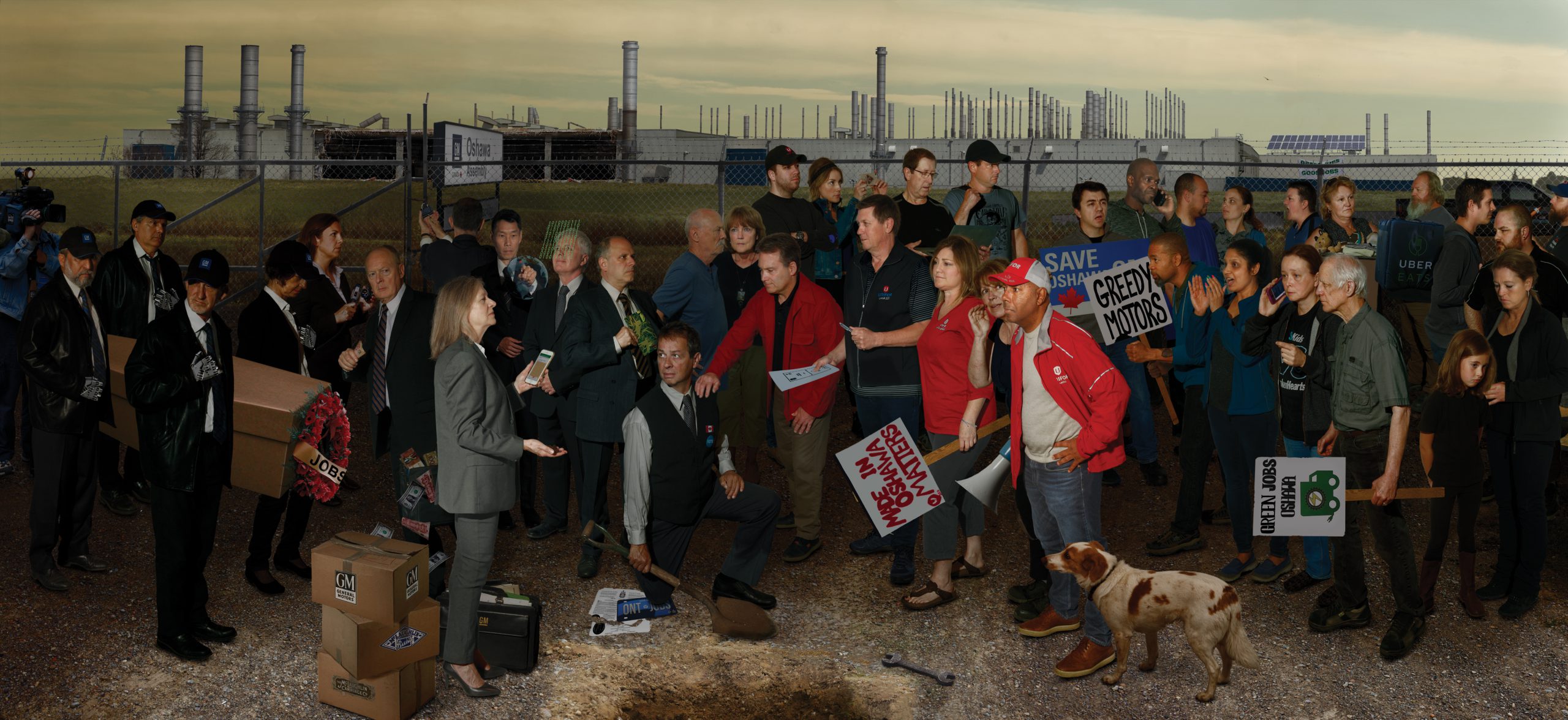Opening Reception: Saturday, October 5 2PM – 4PM
Coming to the opening reception from Toronto? We have organized a bus to bring you to and from the opening! Pick up: in front of OCADU at 1:00PM at 100 McCaul Street and will return to OCADU for 4:30. To reserve a spot on the bus: RSVP to [email protected].
For over 40 years, artists Carole Condé + Karl Beveridge have been creating urgent and insightful work that challenges the status quo and brings to light the important issues facing our time. With unwavering attention and unapologetic political analysis, Condé + Beveridge’s work continues to explore the social and environmental impacts of globalization, racial inequality, class struggle, gendered labour divisions, precarity, and the complex struggles of consensus building. In tandem to this practice, they have worked collaboratively with union members and fellow artists, bringing the labour movement and art world into dialogue and in doing so, have transformed them both.
This exhibition presents the photo series Oshawa: A History of Local 222 (1982-83), a comprehensive body of work that traces the history of the autoworkers union in Oshawa from its formation in 1937 through to the mid-1980s. To produce the work, Condé + Beveridge spent two years interviewing and working with members of the Local 222 Retirees Committee. The resulting work, uses intricately staged tableaux to narrate the workers struggle from the perspective of women working in the plant and highlights gender-specific inequalities, including the fight for married women to be able to work and the inclusion of women in the union.
Looking back over the past 35 years since this series was made, we can see the reversal of many hard-won rights, the slow erosion of jobs and the waning strength of the union. With the threat of General Motors of Canada closing the Oshawa plant in January 2020, Condé + Beveridge have returned to work with members of the Local to create a final image in the series. The large-scale photomural pictures members of the union leadership confronting corporate executives and politicians as they stage a burial for the jobs that will be lost at the plant. Working collaboratively with current members of the union, the piece opens up new possibilities for cooperation, solidarity and artistic production, blurring the distinction between art and work, and aesthetics and politics.
Carole Condé and Karl Beveridge
Canadian artists Carole Condé and Karl Beveridge moved to New York City in 1969, and soon were at the centre of the burgeoning conceptual art movement. In 1975, they joined the Art & Language journal The Fox (with Joseph Kosuth and Ian Burn) and picketed the Whitney Museum of Art to protest its lack of inclusion of women artists and artists of colour, while critiquing the apolitical minimalism of Donald Judd. This ferment culminated in a major museum show, It’s Still Privileged Art, at the Art Gallery of Ontario in 1976, just prior to the artists’ return to Toronto in1977.
By the late 1970s, Condé and Beveridge drew a focus on various issues that were urgent within the trade union movement. Their method of working dialogically with their subjects was invented for the landmark 1981 project Standing Up, and has been refined in numerous subsequent collaborations. In the past three decades, over fifty solo exhibitions of Condé and Beveridge’s work have been presented at major museums and art spaces on four continents, including: the Institute of Contemporary Art (London, UK); Museum Folkswang (Germany); George Meany Centre (Washington); Dazibao Gallery (Montreal); Centro Cultural Recoleta (Buenos Aires); Art Gallery of Edmonton; and the Australian Centre for Photography (Sydney).
Equally, and congruent with the artists’ commitment to accessibility, their work has been displayed in a host of non-art and public settings, such as union halls, billboards, bus shelters and bookworks. The artists continue to work and live in Toronto.
